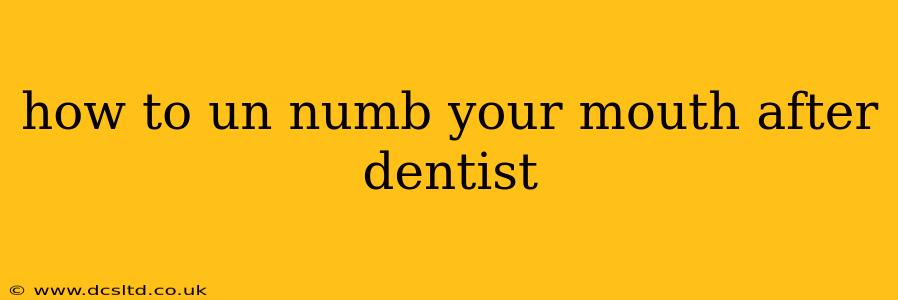Going to the dentist is often necessary, but the lingering numbness from local anesthetic can be frustrating and even slightly concerning. This comprehensive guide will explore various ways to manage and alleviate that post-dental numbness, answering common questions and providing helpful tips for a speedy recovery.
How Long Does Mouth Numbness Last After a Dental Procedure?
The duration of numbness varies significantly depending on the type and amount of anesthetic used, the complexity of the procedure, and individual factors like metabolism. Generally, numbness can last anywhere from a few hours to several hours, sometimes even extending to a full day. In rare cases, more prolonged numbness might occur, warranting a call to your dentist.
What Happens if My Mouth Stays Numb for Too Long?
While temporary numbness is expected, persistent or excessive numbness should be addressed. It's crucial to contact your dentist if the numbness:
- Lasts significantly longer than anticipated (e.g., beyond 24 hours).
- Is accompanied by other symptoms like swelling, pain, or difficulty swallowing.
- Prevents you from feeling the texture of food, potentially leading to biting your cheek or tongue.
Home Remedies to Speed Up the Un-Numbing Process
Several at-home remedies can help accelerate the dissipation of the anesthetic. These aren't guaranteed to work for everyone, but they often provide some relief:
- Gentle Movement and Massage: Gently moving your jaw and massaging the numb area can help improve blood circulation, promoting faster recovery.
- Warm Compress: Apply a warm, damp cloth to the numb area. The warmth can increase blood flow, assisting in the removal of the anesthetic. Avoid excessively hot temperatures.
- Hydration: Drink plenty of water. Staying hydrated supports overall bodily functions and can indirectly aid in recovery.
- Avoid Alcohol and Caffeine: These can interfere with the body's natural recovery processes.
Can I Eat or Drink While My Mouth is Numb?
This is a crucial question! Eating and drinking while numb carries substantial risks:
- Accidental Bites: You may unintentionally bite your cheek, lip, or tongue, leading to injury.
- Burning: Hot foods or drinks won't be registered properly, potentially causing burns.
- Choking: Numbness can impair your swallowing reflex, increasing the risk of choking.
It's strongly recommended to wait until the numbness has significantly subsided before eating or drinking anything. Start with soft, cool foods and liquids.
What Can I Eat After the Numbness Wears Off?
Once the numbness subsides, opt for soft foods that are easy to chew and swallow. Examples include:
- Yogurt
- Applesauce
- Mashed potatoes
- Scrambled eggs
- Oatmeal
How Can I Prevent Future Numbness Issues?
While numbness is a common side effect of dental procedures, you can minimize potential complications by:
- Communicating with your dentist: Discuss any concerns or allergies before the procedure.
- Following post-procedure instructions carefully: Your dentist will provide specific instructions to follow after your procedure.
- Choosing a reputable dentist: A skilled dentist will use appropriate anesthetic techniques to minimize side effects.
What if I Experience Swelling After the Numbness Wears Off?
Some swelling is normal after certain dental procedures. However, significant swelling could indicate a complication. Contact your dentist immediately if you experience excessive swelling, pain, or any other concerning symptoms.
This guide provides general information and should not be considered medical advice. Always follow your dentist's instructions and contact them with any questions or concerns regarding your post-dental numbness.
